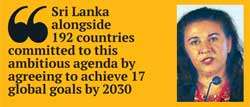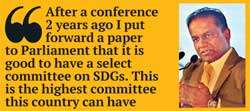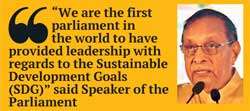Reply To:
Name - Reply Comment
Last Updated : 2024-04-26 02:12:00
 “We are the first parliament in the world to have provided leadership with regards to the Sustainable Development Goals (SDG)” said Speaker of the Parliament, Karu Jayasuriya at #SDGDataLK. This national symposium, the first of its kind, was held recently at Water’s Edge. The goal of this gathering was to provide a platform to enhance the use of data towards a Sustainable Sri Lanka.
“We are the first parliament in the world to have provided leadership with regards to the Sustainable Development Goals (SDG)” said Speaker of the Parliament, Karu Jayasuriya at #SDGDataLK. This national symposium, the first of its kind, was held recently at Water’s Edge. The goal of this gathering was to provide a platform to enhance the use of data towards a Sustainable Sri Lanka.
This would be done under the theme ‘Data for Effective Policy Making and Implementation of the Sustainable Development Goals’.
With more than 300 participants, this two-day symposium was jointly organised by the Government of Sri Lanka and the United Nations and brought together multiple stakeholders from the Government, UN Agencies, Private Sector, Civil Society Organizations, Academia, and Data and Research organizations, to discuss the importance of using data towards evidence-based policy and decision-making.
Excerpts from the opening day follow:
“The UN extends its support to Sri Lanka in mapping local data to the SDGs”
According to UN Resident Coordinator a.i. Ms. Simrin Singh, the Sustainable Development Goals are not necessarily UN SDGs, but in fact owned by all of us. “Sri Lanka alongside 192 countries committed to this ambitious agenda by agreeing to achieve 17 global goals by 2030. These goals will define Sri Lanka in 2030 and ensure a better tomorrow for all of us,” said Singh.
She explained how data tied into the idea of achieving these goals as being the starting point in knowing several factors such as the level of poverty, life expectancy and levels of education. “Knowing this crucial information helps to drive decisions to understand where we are now, where we need to get to and to guide us in getting there. This symposium is relevant in our journey in achieving these goals,”she added.
Baseline data mapped against these indicators will tell us where Sri Lanka stands at present in relation to SDGs and this is the starting point. “The UN extends its support to Sri Lanka in mapping local data to the SDGs and will ensure that no one is left behind,”said Singh.
We can’t wait till 2030. We have to decide on the frequency through which we will monitor the progress in achieving these goals
“The 2030 vision is institution oriented ”
Prof. Mohan Munasinghe, Chairman of the Presidential Expert Committee on Sustainable Sri Lanka 2030 Vision, summarised that the idea of the symposium is to show how important data is and how it fits in the overall development. “Our Sustainable Development Goals process has data indicators and targets and hopefully the priorities we have identified will help to inform that process. The 2030 vision is not a political manifesto but we hope it is practical as it is institution oriented and the ultimate goal is to build a national consensus on sustainable development,” said Munasinghe.
 The Professor highlighted that the key vision that the President enunciated at the UN General Assembly is that Sri Lanka wants to become a sustainable upper middle income Indian Ocean hub with an economy which is prosperous competitive and advanced, environment that is green and flourishing and a society that is inclusive harmonious peaceful and just which will follow the middle path on balanced green growth. “The report hopefully guides us towards this balanced path and takes us from 2018 to this sustainable vision of 2030 and in the process we need to transform our values and institutions,”he said.
The Professor highlighted that the key vision that the President enunciated at the UN General Assembly is that Sri Lanka wants to become a sustainable upper middle income Indian Ocean hub with an economy which is prosperous competitive and advanced, environment that is green and flourishing and a society that is inclusive harmonious peaceful and just which will follow the middle path on balanced green growth. “The report hopefully guides us towards this balanced path and takes us from 2018 to this sustainable vision of 2030 and in the process we need to transform our values and institutions,”he said.
According to Munasinghe the Committee has identified several sectors as well as cross-cutting themes like gender and reconciliation. The integration has been done by first making an effort to integrate between the environment, economy and society which has not been done in this country before.
“Then we link up the sector and the cross cutting themes it is a holistic process. What this nexus means for development globally is that there is this concept called ecological footprint of humanity which says that by 2030 we would need the equivalent of two planet earths to sustain life as it is on this planet. If we look at who is doing all this consumption it is the rich who consumes 85% of the planet’s resources, so there is huge inequality in the consumption. You see that if the rich are consuming more than one planet worth where are the resources for the poor? That’s why we have so many unkept promises and now we are down to the last leg, the SDGs, and that’s why we have to make it work,” he added.
The Professor said that the 17 SDGs should be adapted to fit our needs where the country fixes the priorities and the SDGs provides a framework.. The Committee has a special focus on social issues since the President is keen on that. Munasinghe highlighted that Sri Lanka has to find this inclusive green growth path to development.
“As a policy making body we need data for policy decisions”.
According to R.H.W.A. Kumarasiri, Additional Secretary to the Ministry of National Policies and Economic Affairs, the Government is responsible for streamlining the development agenda for 2030, for all departments and ministries, and is responsible for collecting and analysing data. “The Department of Census and Statistics is only responsible for 75 indicators while other Government agencies are responsible for 131 indicators which is more than 50% of the total,” Kumarasiri said.
Kumarasiri explained that there is a lot of data at the grassroots level, and as Government agencies they are tasked with collecting that data, summarising it, analysing it and providing it in line with the SDG 2030. “As a policy making body we need data for policy decisions,”added Kumarasiri.
“Everyone needs to be part of the equation.”
Karin Fernando, Senior Research Professional from CEPA, highlighted that the big point of the SDGs is to leave no one behind. “Everyone needs to be part of the equation. This is a challenge. The challenge is also more complex when the goal is not to leave anyone behind. The goal also talks about not letting people fall behind as well. We also need to think about these people as much as capturing those that are not. Therefore it is necessary to collect more nuanced data,”explained Fernando.
“There might be discrepancies and we should recognise them.”
Dr. Mark Landry, Regional Advisor of WHO South East Asia, detailed how in July 2016 the Ministry of Health organised a workshop on the health related SDGs which illustrated several issues. “There is still a lack of clarity as to the definition of metadata. We also need to acknowledge new indicators,” said Landry. He emphasised how there is a global health estimate for a number of these indicators. The question is whether that estimate is valid and if not how we dispute that with our national primary data. “There might be discrepancies and we should recognise that,” he stressed.
“It’s high time to start our work in a systematic manner.”
 Director General of the Department of Census and Statistics, Dr. A.j. Satharasinghe, gave a detailed description of the activities of the DCS in its work with the SDGs. “Already 3 years have passed and it is high time to start our work in a systematic manner. The Government of Sri Lanka is expecting to achieve these goals by 2030. There are now 12 years to achieve this,” said Satharasinghe.
Director General of the Department of Census and Statistics, Dr. A.j. Satharasinghe, gave a detailed description of the activities of the DCS in its work with the SDGs. “Already 3 years have passed and it is high time to start our work in a systematic manner. The Government of Sri Lanka is expecting to achieve these goals by 2030. There are now 12 years to achieve this,” said Satharasinghe.
According to him all 244 indicators are not relevant to Sri Lanka. “We have to localise this. For this we need to estimate baseline data for the indicators relevant to the country. Then we have to decide where we are going and what values we would like to see for the identified indicators in 2030. We can’t wait till 2030. We have to decide on the frequency through which we will monitor the progress in achieving these goals,”said Satharasinghe.
He detailed that the DCS had done a study about a year back to identify the indicator framework giving all the corresponding information. “We tried to prepare the indicator framework in respect of the indicators prepared by the DCS. First I formed a high level committee which looked at the indicators published by the UN Statistics Division which provides the metadata of the indicators. They studied the metadata file on each indicator. This gives enough information and definitions about the indicators and we should all look at it. Just looking at the indicator would make it very complicated.
After that the DCS came out with a classification system in respect for the indicators compiled by the DCS. The UNSD has come out with a clear classification system, but I thought it wasn’t enough for Sri Lanka to start with, so we came up with another system. With regard to some indicators we have baseline data, and for some indicators the definitions are exact UN definitions and for some there are no exact UN definitions but proxy indicators which is encouraged by the UN as well. Some indicators are not compiled by the DCS because our mandate is to compile demographic and socio-economic data,” said Satharasinghe.
The 2030 vision is not a political manifesto but we hope it is practical as it is institution oriented and the ultimate goal is to build a national consensus on sustainable development
“It’s unique that Sri Lanka has a focus area on data”
Chair of the UN Sustainable Development Framework Driver 1, Ritsu Naken stated that the UN has been honoured to support the SL process and the UNSD framework is a 5-year business plan. “It is truly unique that Sri Lanka has a focus area on data which many other countries do not have,” said Naken.
“The Sri Lankan health sector has been achieving a great deal and Sri Lanka is a model country in this regard. The survey reveals that 90% of women give birth with a professional health sector worker. It sounds good, but to achieve the SDGs we have to look at the remaining 10% and how we can achieve the remaining percentage. For this we need multidisciplinary data and analysis of that data to understand why this 10% is left behind,” he added.
“As a committee we are pushing this agenda.”
Chairman of SDG Parliamentary Select Committee Thilanga Sumathipala explained how the Government has found that it is important that the drive for SDGs is the responsibility of Parliament.
 “After a conference 2 years ago I put forward a paper to Parliament that it is good to have a select committee on SDGs. This is the highest committee this country can have. What happens is that institutes like the DCS can present its case and Parliament and initiate a steering role to drive the process. We can’t do this without the help of UN agencies,” said Sumathipala.
“After a conference 2 years ago I put forward a paper to Parliament that it is good to have a select committee on SDGs. This is the highest committee this country can have. What happens is that institutes like the DCS can present its case and Parliament and initiate a steering role to drive the process. We can’t do this without the help of UN agencies,” said Sumathipala.
According to Sumathipala, a gap in data collection and usage has been identified. Innovative ideas such as the usage of a dashboard and uniformity in the IT platform that is being used are being considered, so that from the GM division to the higher levels there will be a synchronization of data.
“We also have more than 60,000 graduates, so in each GM division we can have an SDG officer to work on the collection of data.
The Government can prioritize what SDGs it wants to work on. For any policy to be ready for the country and the availability of data are matters that have to be spearheaded by the bureaucrats, so we are trying to bridge that gap as well. As a committee we are pushing this agenda,”he added.
Pix BY Nisal Baduge

Add comment
Comments will be edited (grammar, spelling and slang) and authorized at the discretion of Daily Mirror online. The website also has the right not to publish selected comments.
Reply To:
Name - Reply Comment
US authorities are currently reviewing the manifest of every cargo aboard MV
On March 26, a couple arriving from Thailand was arrested with 88 live animal
According to villagers from Naula-Moragolla out of 105 families 80 can afford
Is the situation in Sri Lanka so grim that locals harbour hope that they coul